DownUnderNoel
Member
- Joined
- Apr 26, 2012
- Messages
- 38
As it happens my first attempt at a trip report is not from the usual part of the world, it’s from close to our first home. Coincidentally last month RedDirtDawg asked me if we ever get out in the bush when we’re home in Australia and I replied, no not really we save that for Utah. Well we had a long weekend come up for the Queens Birthday, the weather was looking perfect and Mrs DownUnder had always wanted to visit Mungo National Park on the edge of the outback just 350 miles from home.
We had along our learner driver son and he wanted to clock up some log book hours on the long straight roads. Official lesson; learning to stay alert when there’s nothing going on. Just the odd semi coming the other way on a single lane of pavement where you learn to yield. Actual lesson; how to dodge sheep.
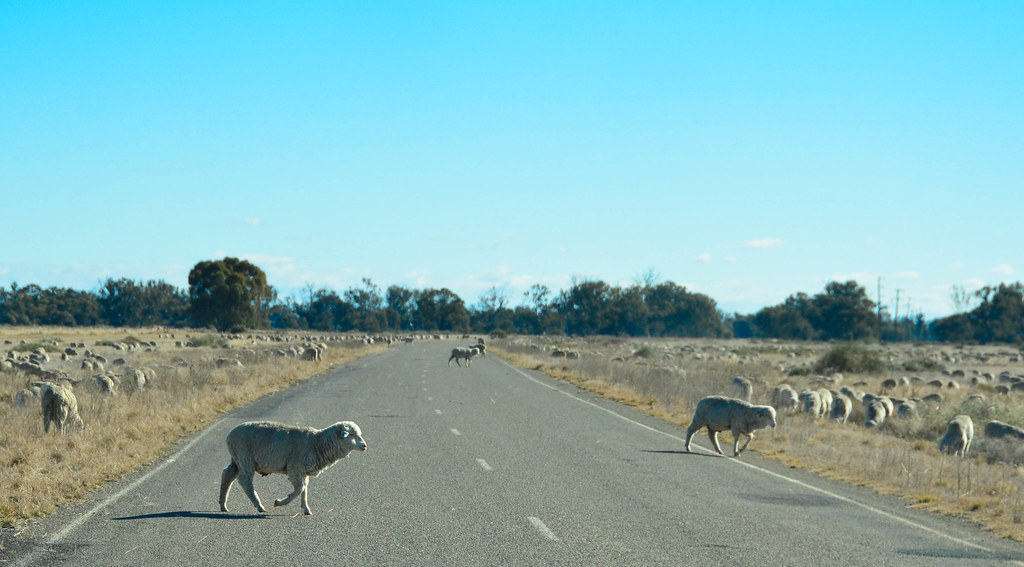
Learner Driver by outtrimau5, on Flickr
Balranald is the last town before Mungo, a small town on the highway between Sydney and Adelaide. It’s also the last chance for gas, from there it is 200 mile round trip mostly on rough dirt road. Travelling north of the small town of Balranald it is flat, scrub spotted plains with free range sheep, cattle and the odd windmill. Not much else.
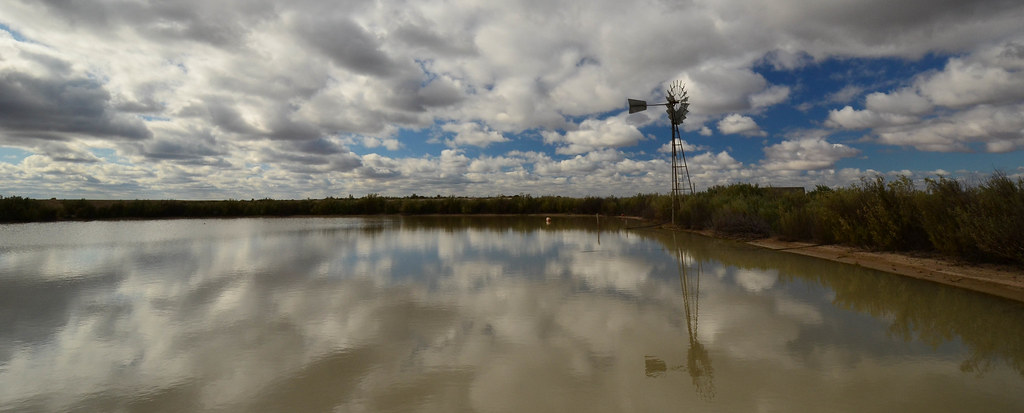
Windmill by outtrimau5, on Flickr
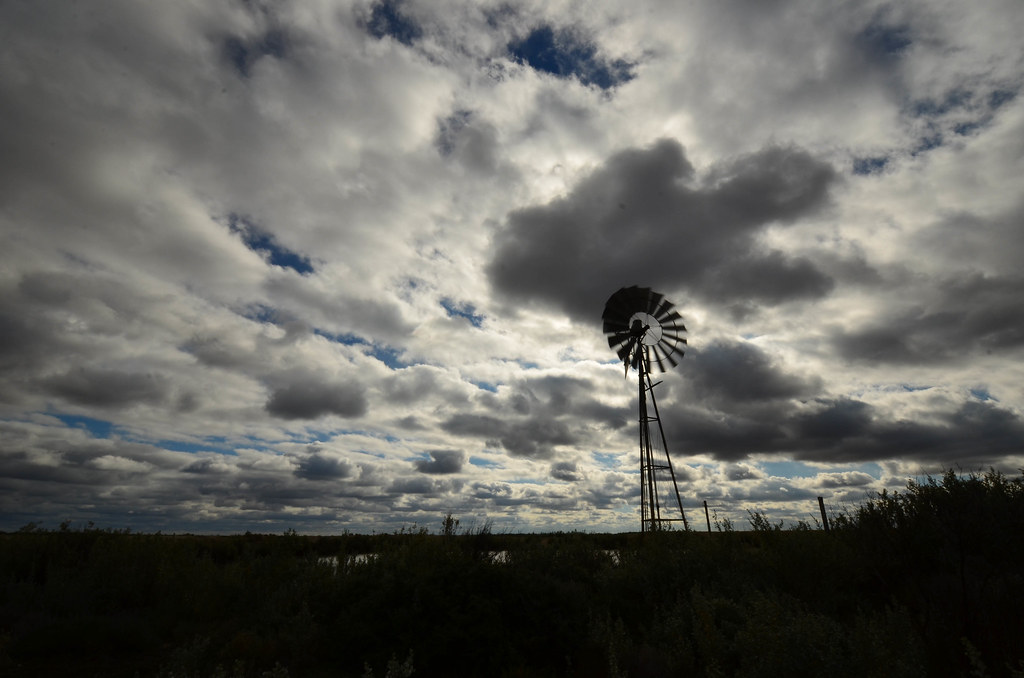
Another windmill by outtrimau5, on Flickr
The last 70 miles to the park are teeth rattling dirt road. The Mungo Visitor Centre letterbox meant we were getting close.
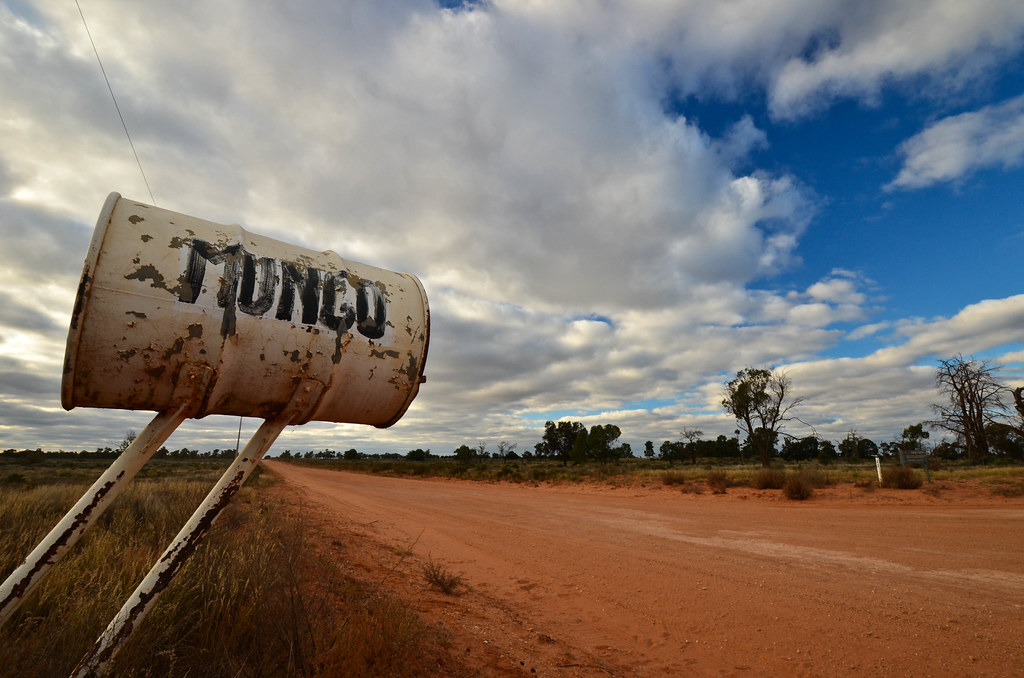
Mungo National Park by outtrimau5, on Flickr
From the letterbox it was just ½ mile of pavement, the only pavement around, to the visitor centre. The visitor centre is often un-manned and features displays detailing the local archaeological and cultural history.
-Prehistoric giant wombats.
-Mungo Man. The remains of an ancient local man dated at 42,000 years old discovered on the shore of Lake Mungo.
-Mungo Lady. Cremated remains of a local lady also dating back 42,000 years and believed to be the oldest cremated human remains.
We paid the self service park fee and picked up a map. Being winter it was now getting late in the day and only an hour until sunset.
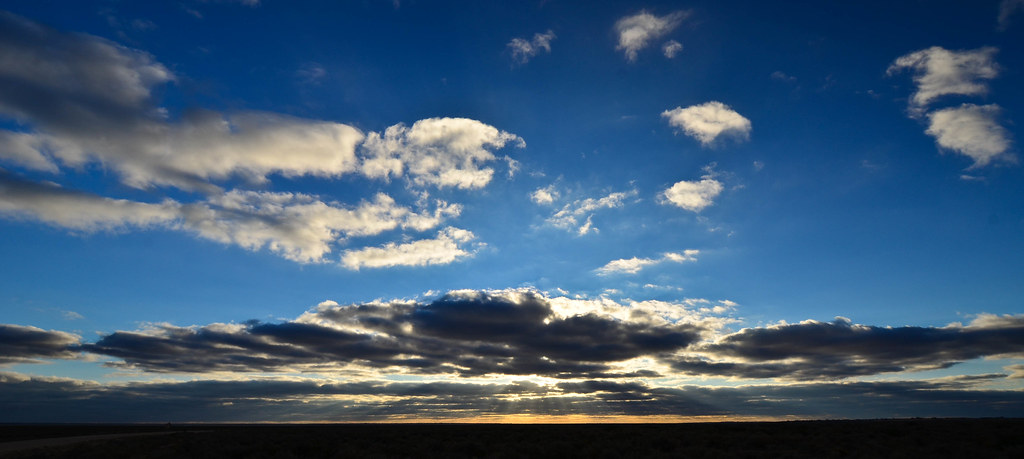
Lake Mungo, late afternooon. by outtrimau5, on Flickr
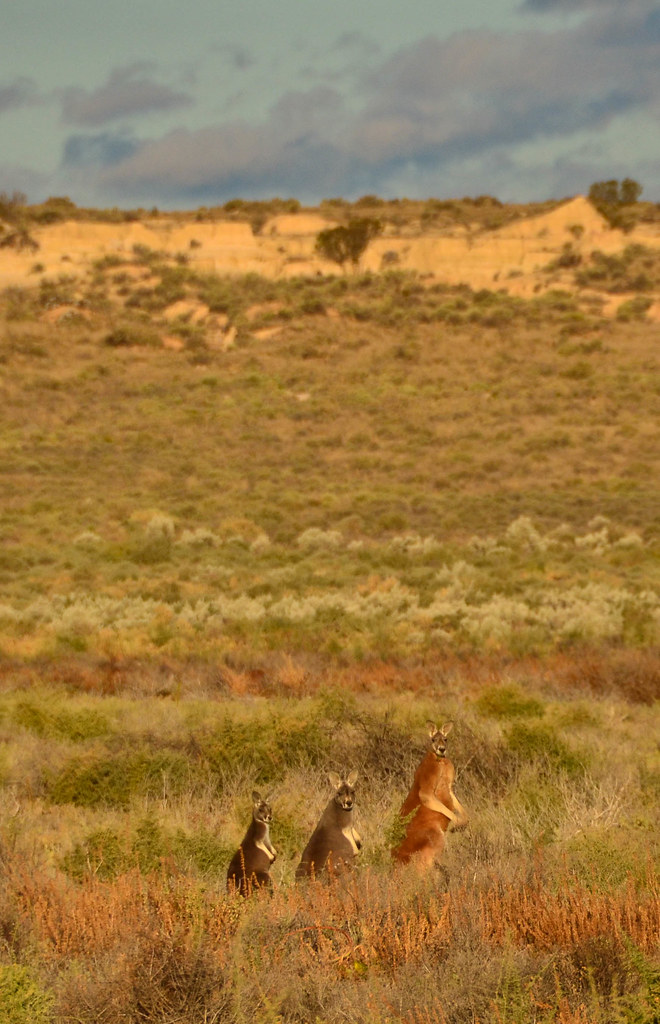
Kangaroos by outtrimau5, on Flickr
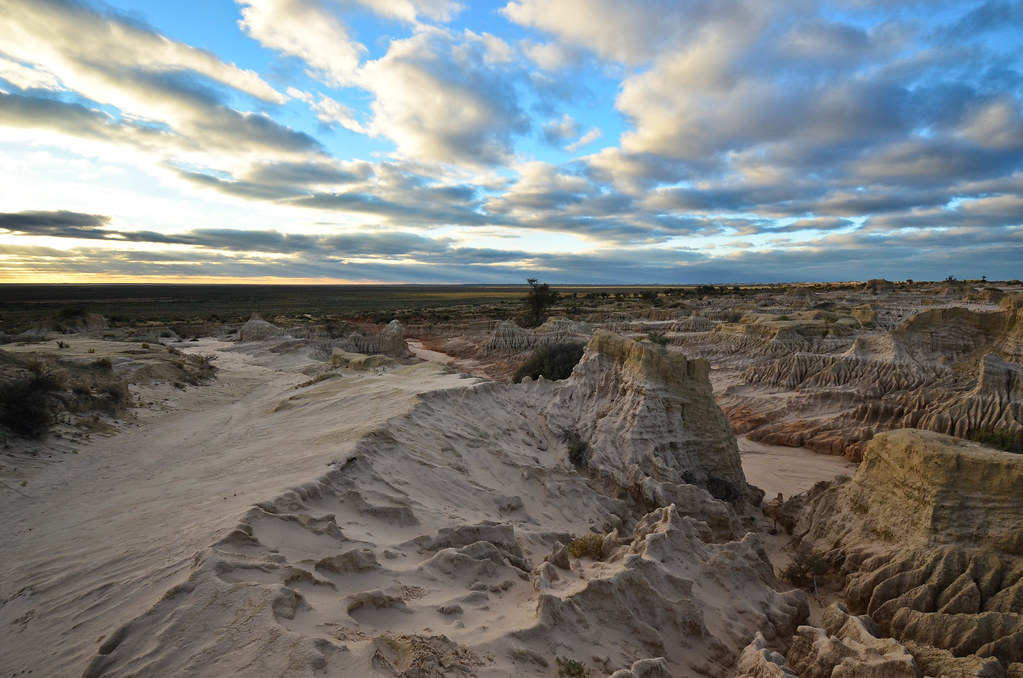
Mungo National Park by outtrimau5, on Flickr
The clouds had built up during the afternoon and blocked out the sun until only a couple of minutes before sunset. When the sun did break through there was a short but brilliant light display on the Walls of China and across the lakebed.
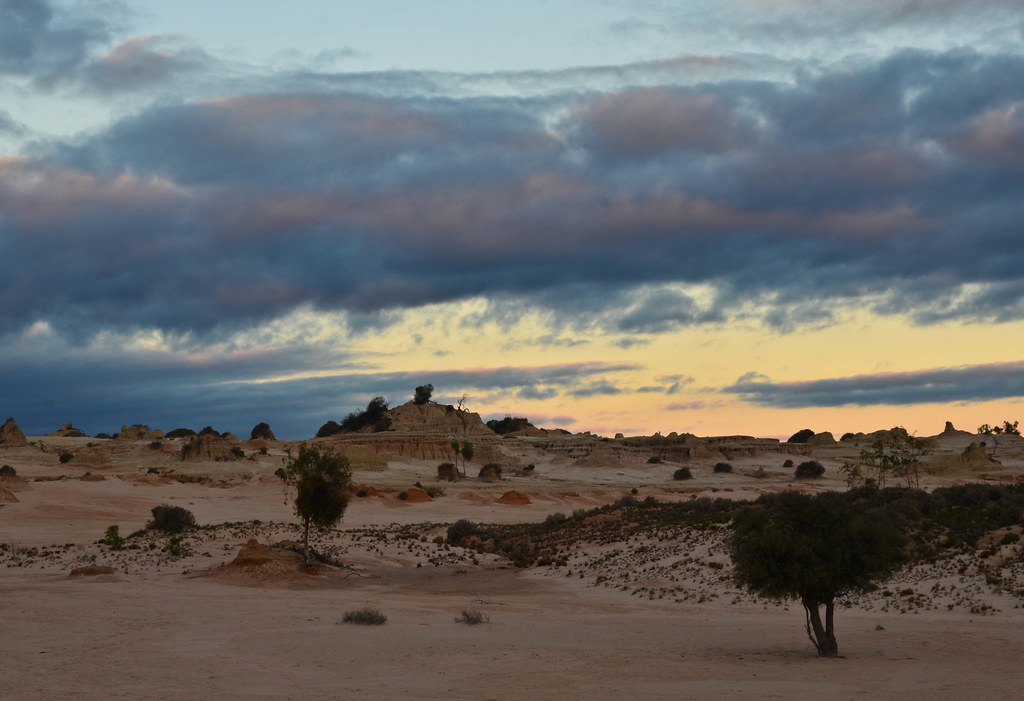
Mungo National Park by outtrimau5, on Flickr
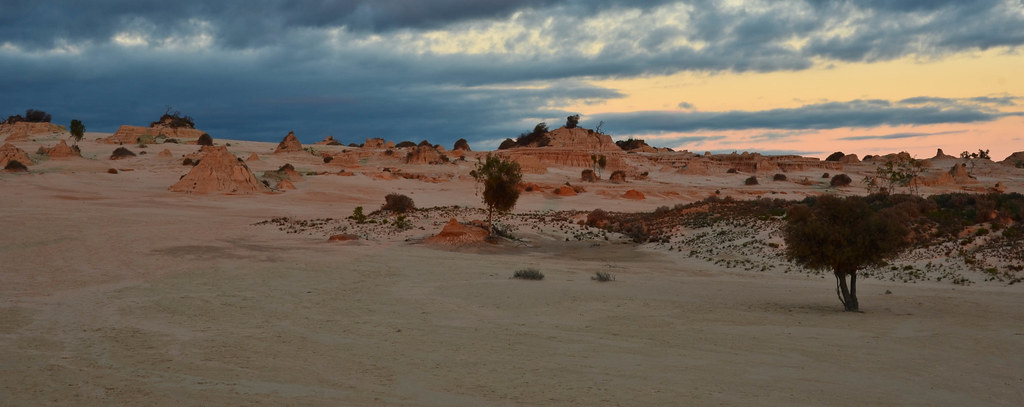
Mungo National Park by outtrimau5, on Flickr
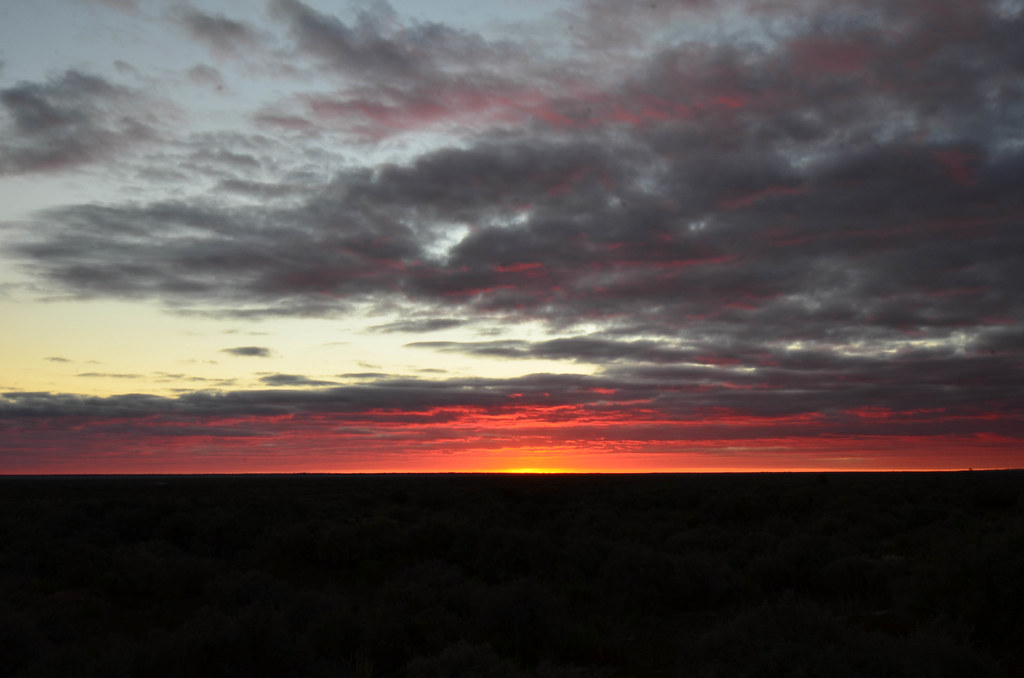
Mungo National Park by outtrimau5, on Flickr
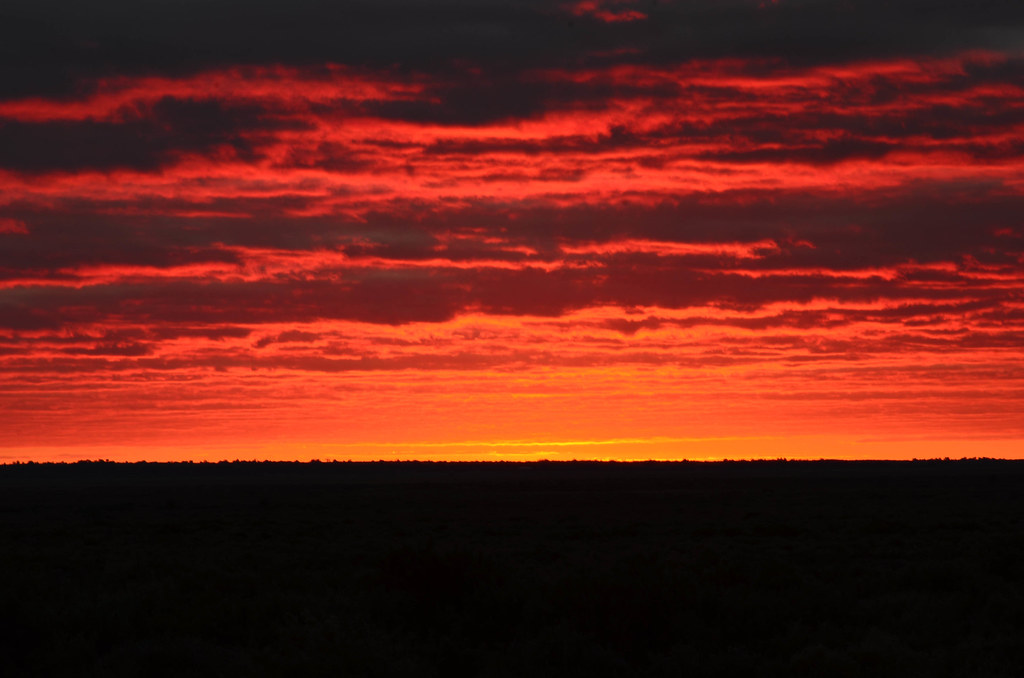
Mungo National Park by outtrimau5, on Flickr
An evening meal at the Mungo Lodge (no roughing it for us) was followed by a seat at the fire place with other travelers, beer and too much red wine.
Next morning the galahs, including myself, were up early.
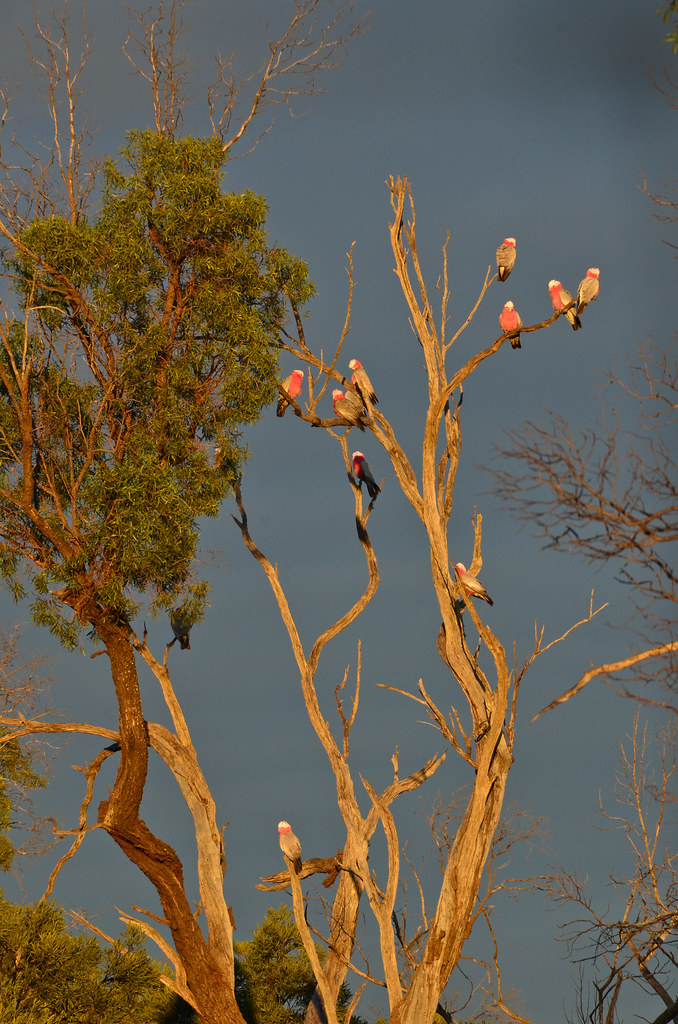
Mungo Lodge by outtrimau5, on Flickr
Near the visitor centre is a shearing shed constructed in 1869. It has stood up pretty well to the years and still smells of sheep.
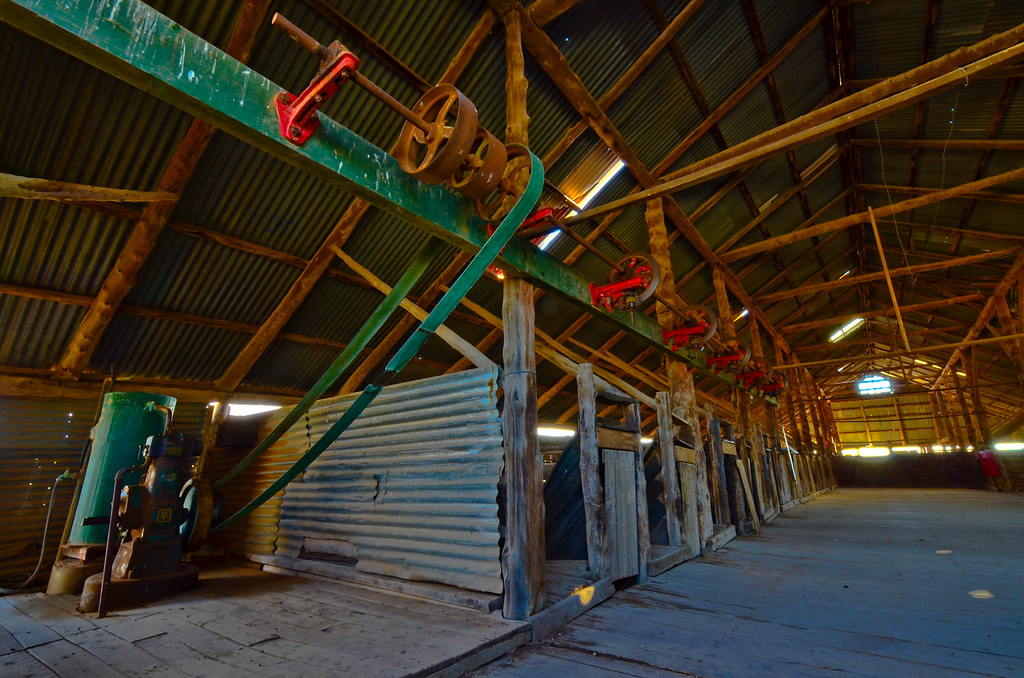
Woolshed by outtrimau5, on Flickr
The road across the base of dry Lake Mungo is limetone base. Dusty, a little rough, but smooth enough and straight through prime kangaroo country. It is a fun drive after sunset
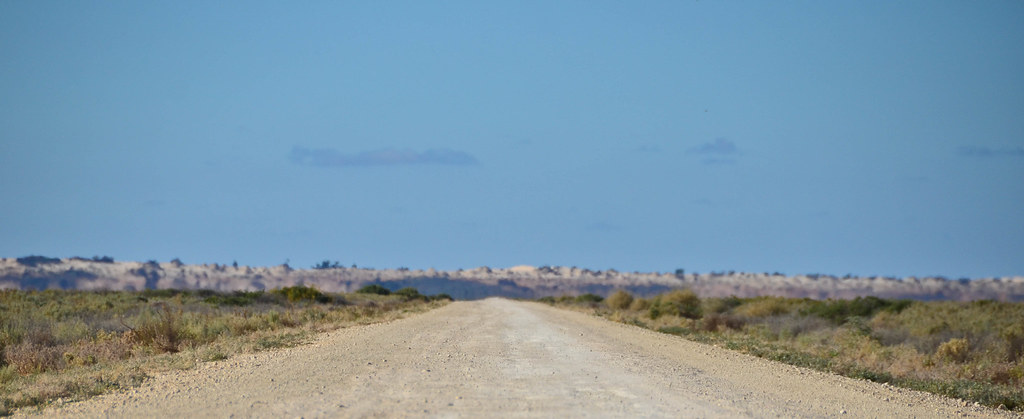
Lake Mungo by outtrimau5, on Flickr
Once we were across the lake we were off on the one way loop around the outback bush. The loop is 40 odd miles of more dirt road, two wheel ruts for much of the way hence the requirement for one way traffic. The countryside varies from open plains with belah trees, to reasonably thick mallee forest. Lots of wildlife; dozing kangaroos would poke their heads above the scrub to see who was going past, curious emus would poke on by to see what meals our passing had stirred up, galahs would continue making out in the trees regardless of who was watching.
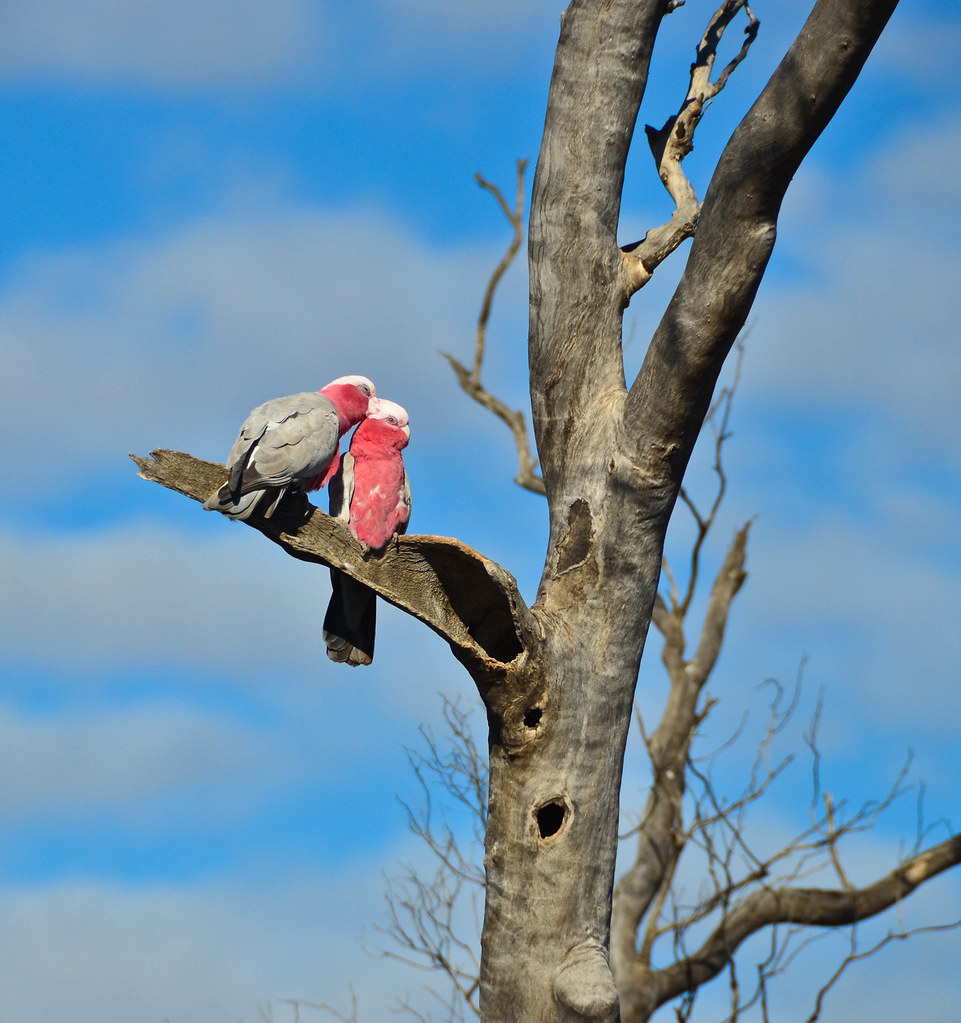
Mungo Track Birdlife by outtrimau5, on Flickr
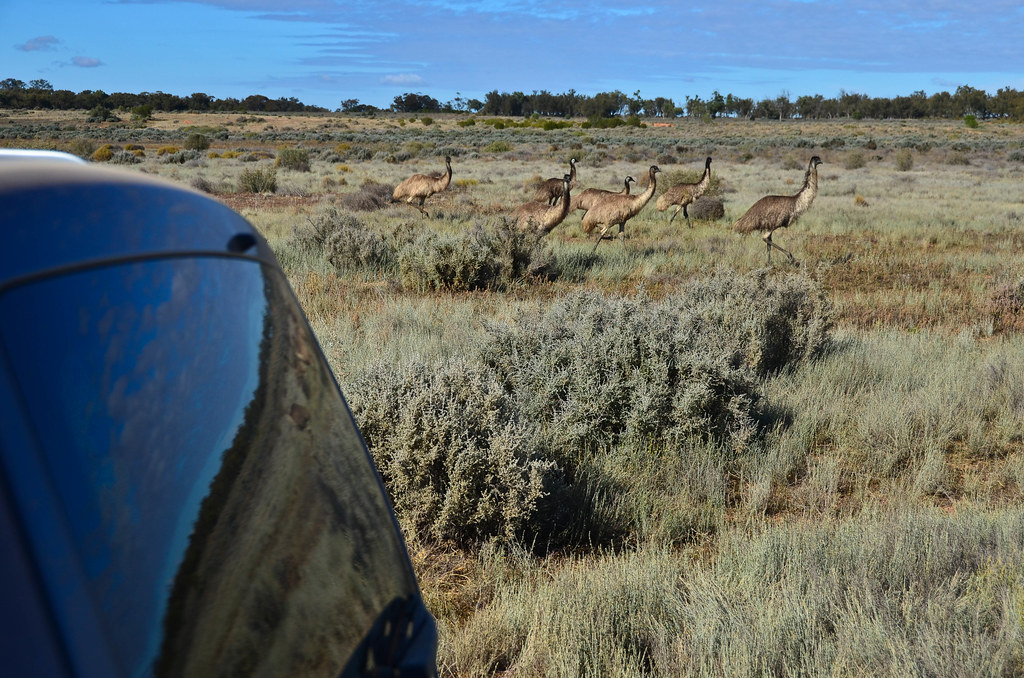
More Mungo Track Birdlife by outtrimau5, on Flickr
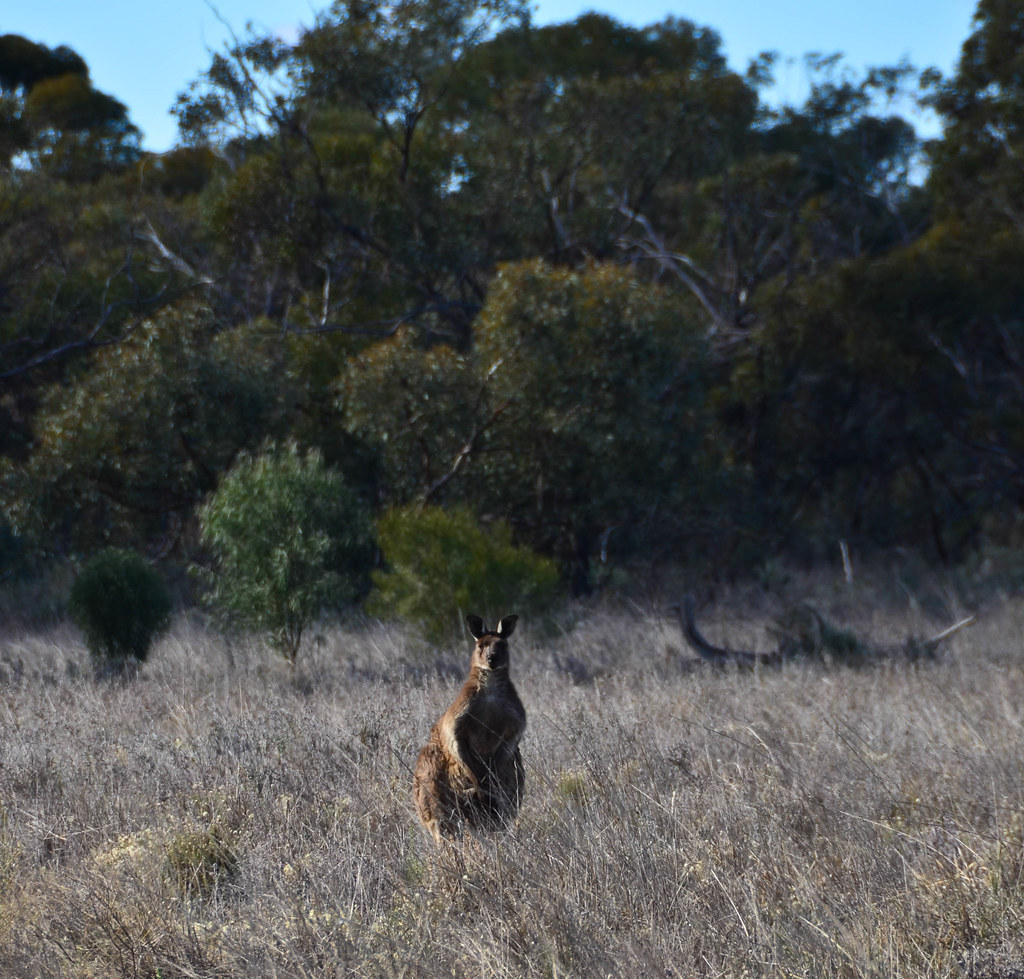
Mungo Track Wildlife by outtrimau5, on Flickr
Feral animals have taken their toll on the landscape stripping bare the vegetation and running the natives out of area. Rabbits are thick on the ground and seemingly beyond eradication. Feral goat herds still roam the bush but their numbers are reduced. A goat trap was constructed around this tank using the water to lure the goats where they would be contained and then trucked away ‘humanely’.
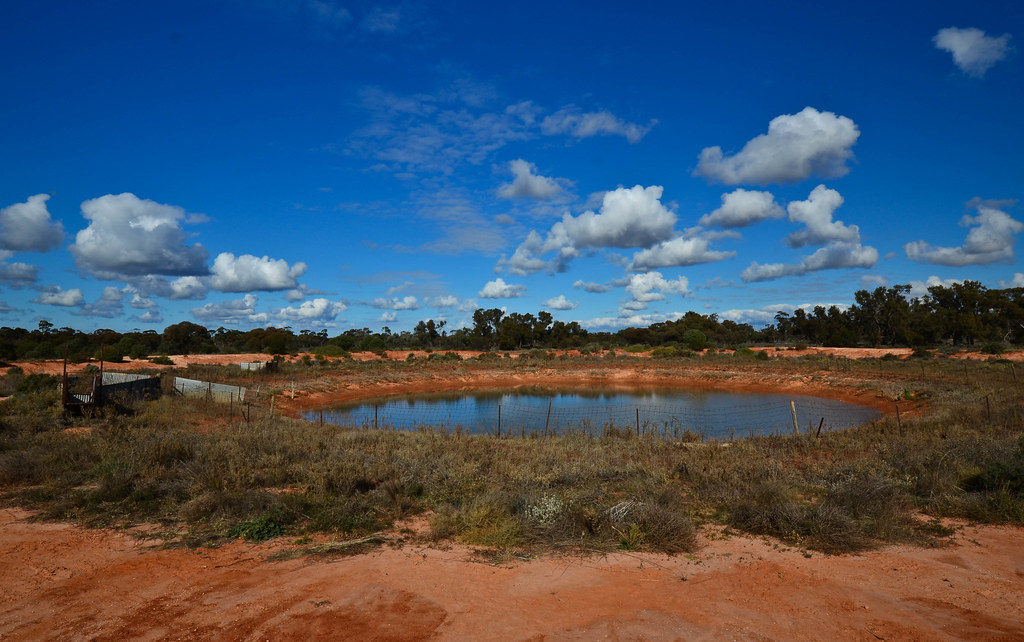
Feral Goat Trap by outtrimau5, on Flickr
Near Vigar Well, a near permanent water source, are some sand dunes. We didn’t have to walk far to leave the tourists behind and find virgin wind swept sand.
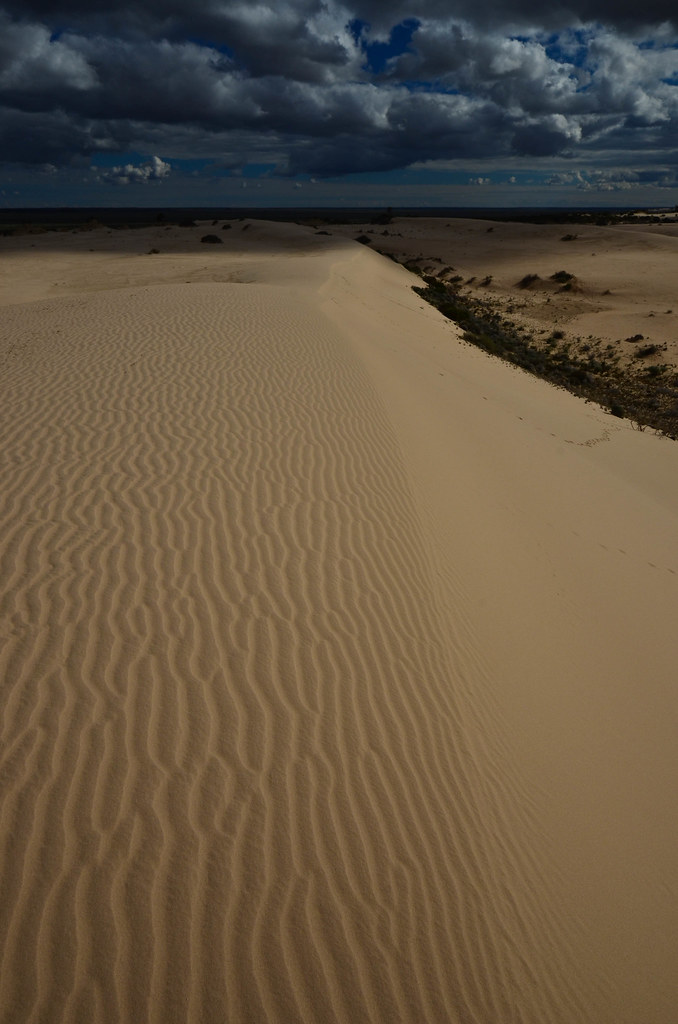
Dunes near Vigars Well by outtrimau5, on Flickr
The dunes border the lake at the northern end of the Walls of China.
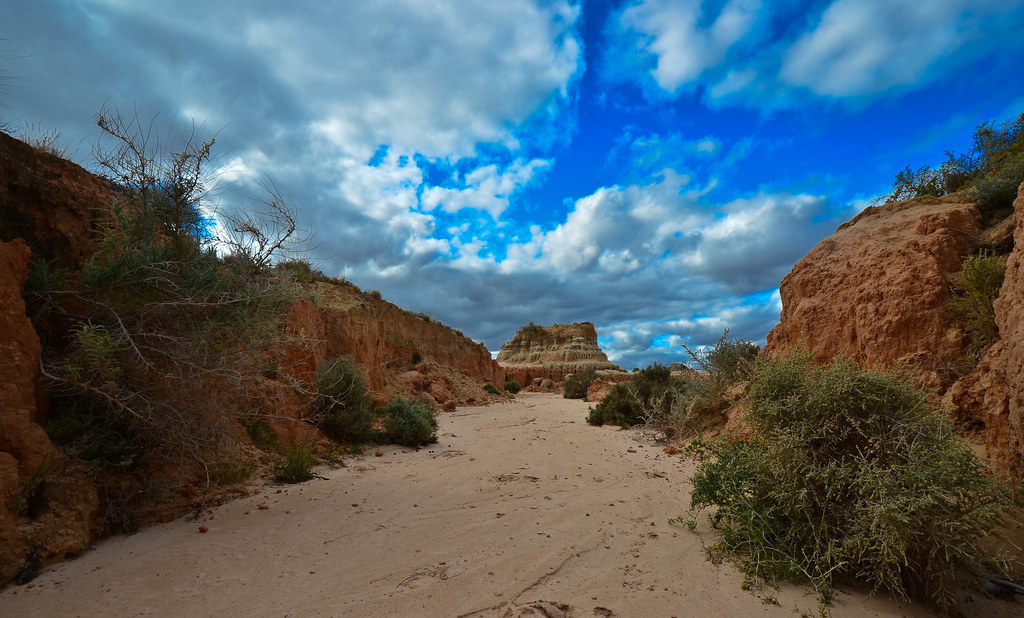
Walls of China by outtrimau5, on Flickr
Although there were no people tracks there were many kangaroo, emu, rabbit and goat tracks criss-crossing the sand. Here’s some emu tracks with my size 12 Columbias along side.
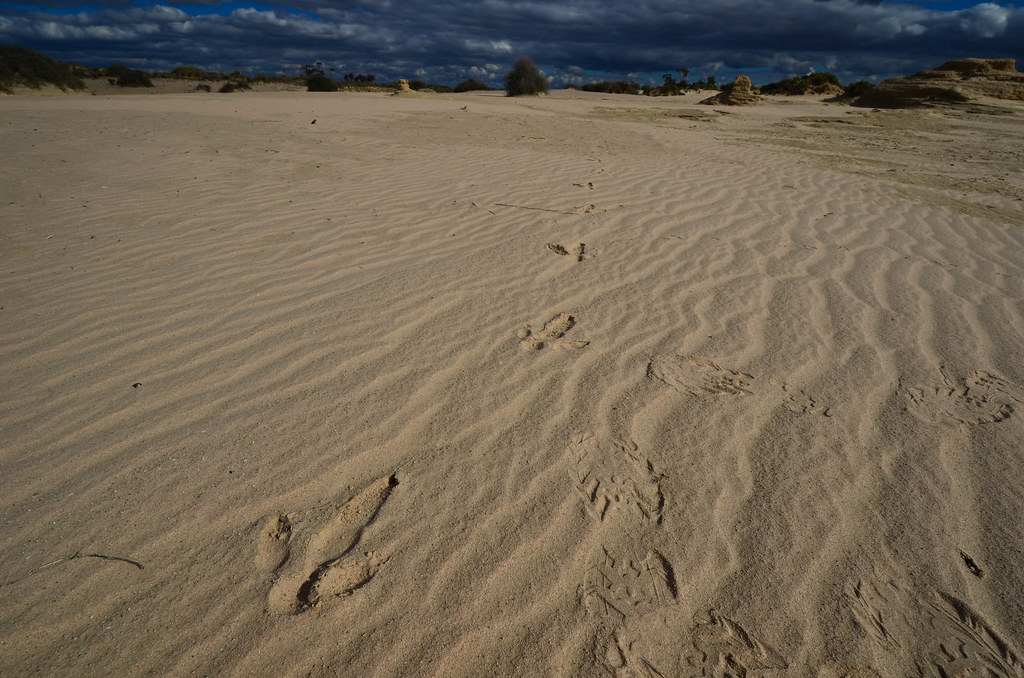
Emu prints near Vigars Well by outtrimau5, on Flickr
Trying to be “arty”.
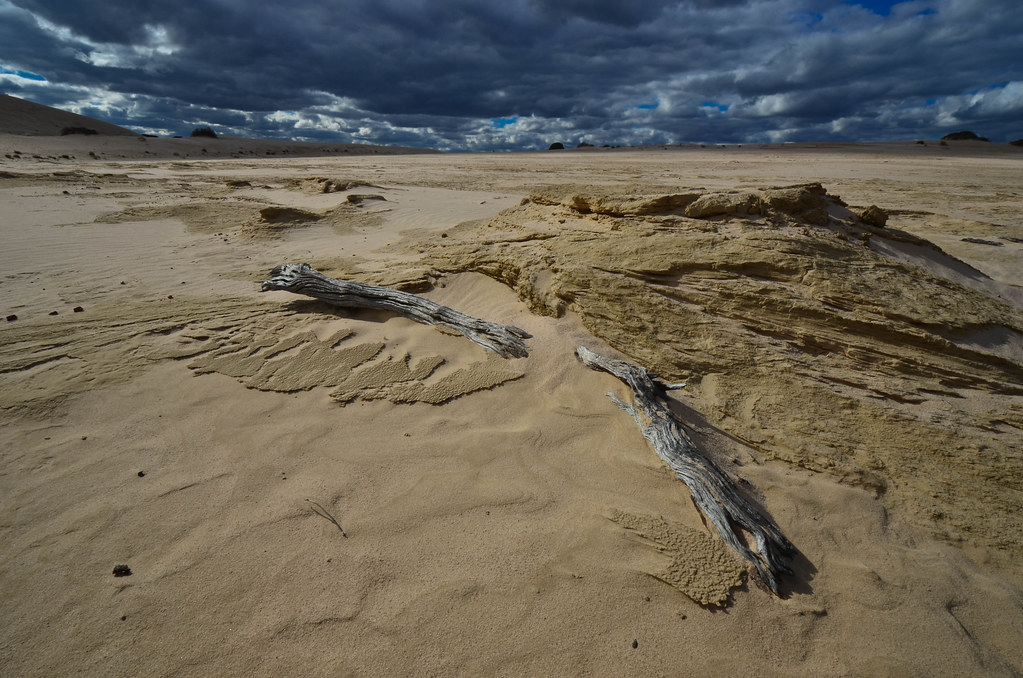
Dunes near Vigars Well by outtrimau5, on Flickr
Heading back towards the car my son decided he’d had enough and left me behind. He’s the little black streak on the far dune.
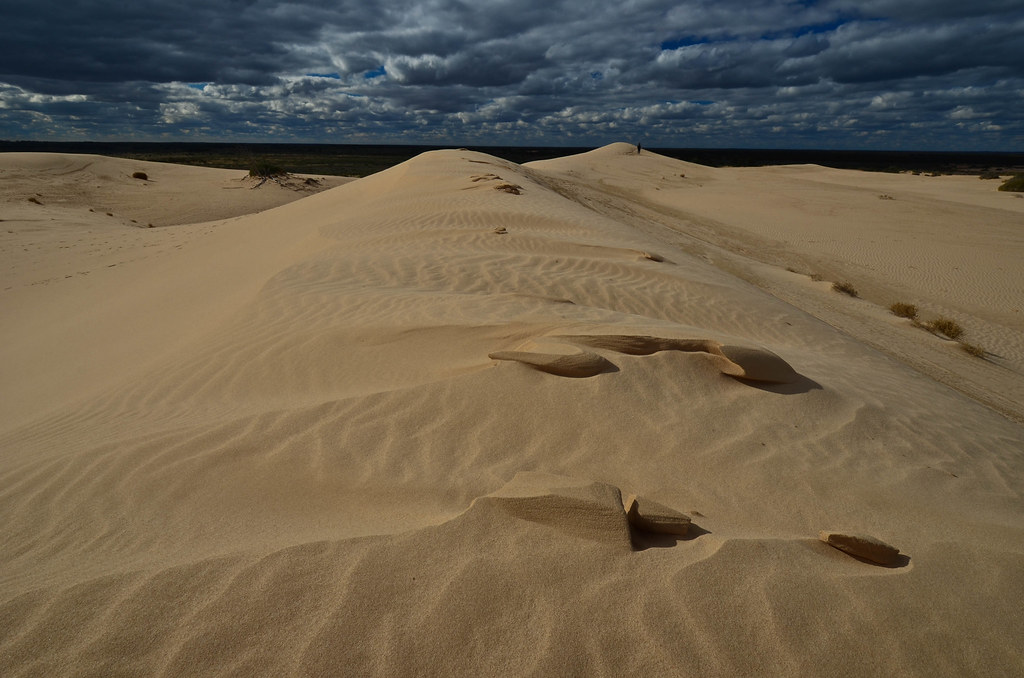
Sand Dunes by outtrimau5, on Flickr
Another windmill.
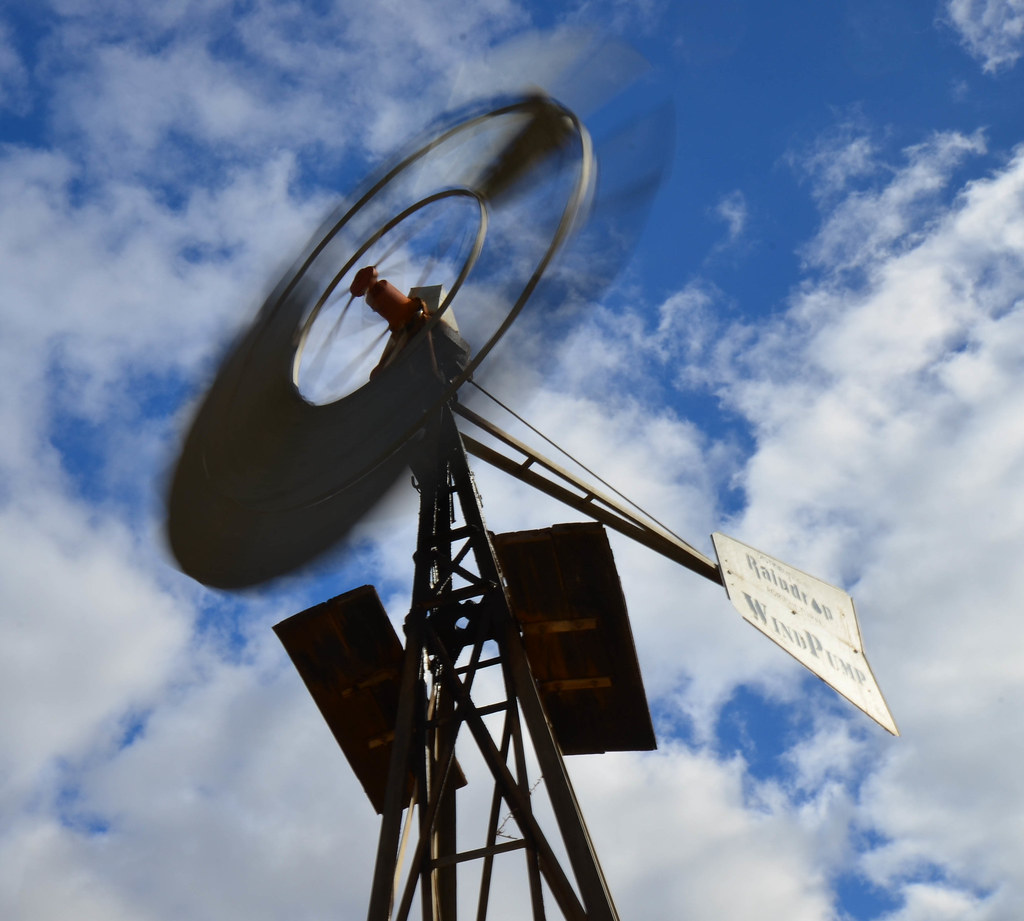
Zanci Tank, Lake Mungo by outtrimau5, on Flickr
More emus.
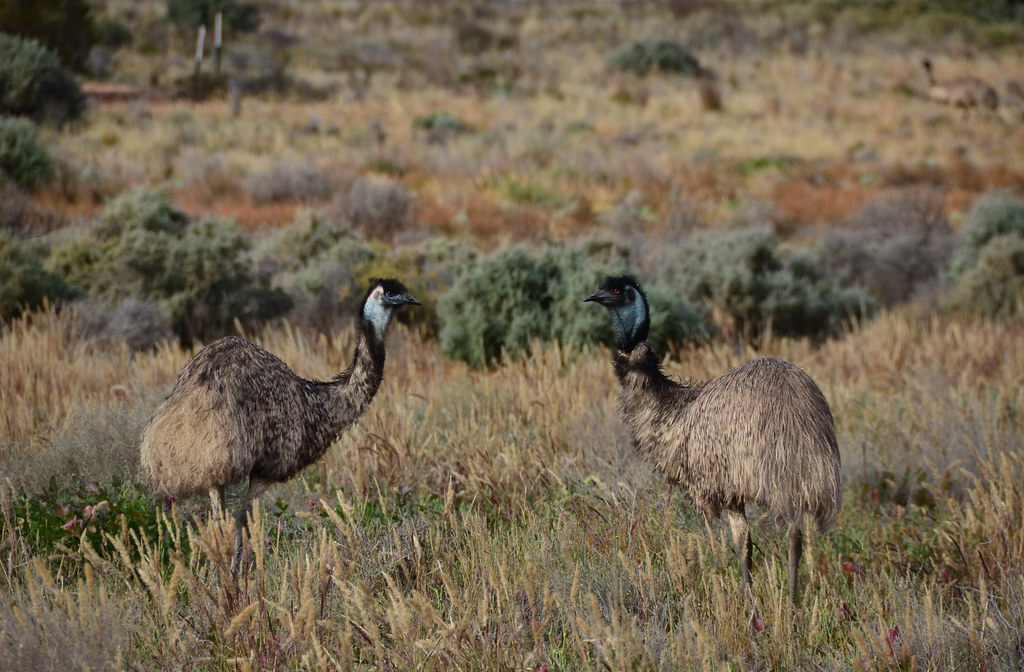
Emus by outtrimau5, on Flickr
The rabbit proof fence where it crosses Lake Mungo. One of many fences built in an attempt to keep the rabbits out in the early 1900’s.
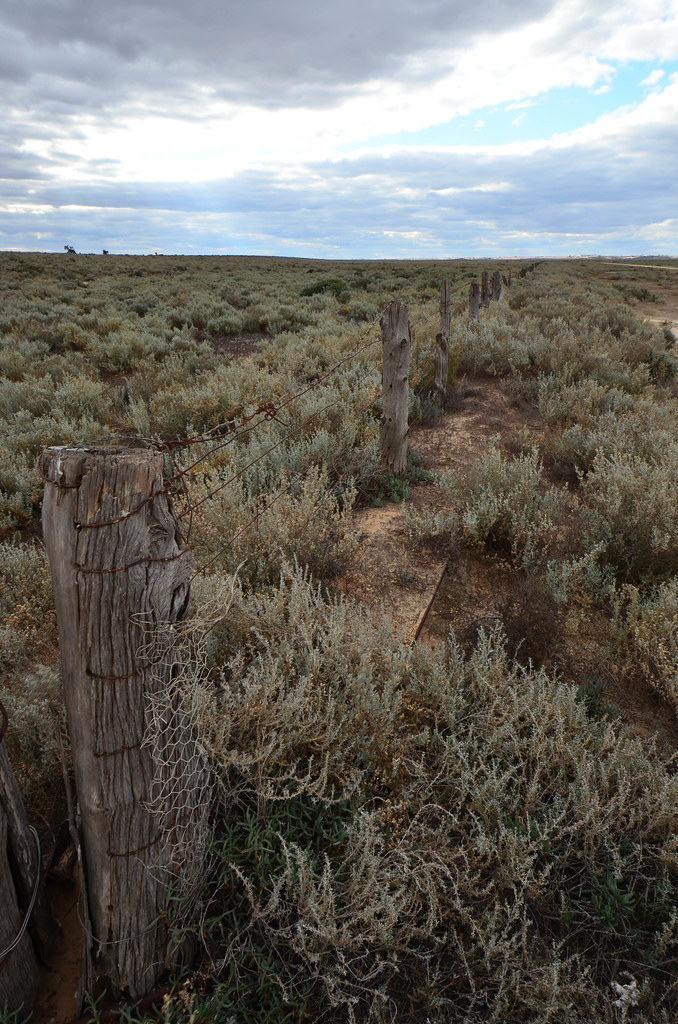
Rabbit Proof Fence by outtrimau5, on Flickr
On the pavement outside the park visitor centre a few emus stopped by for a drink.
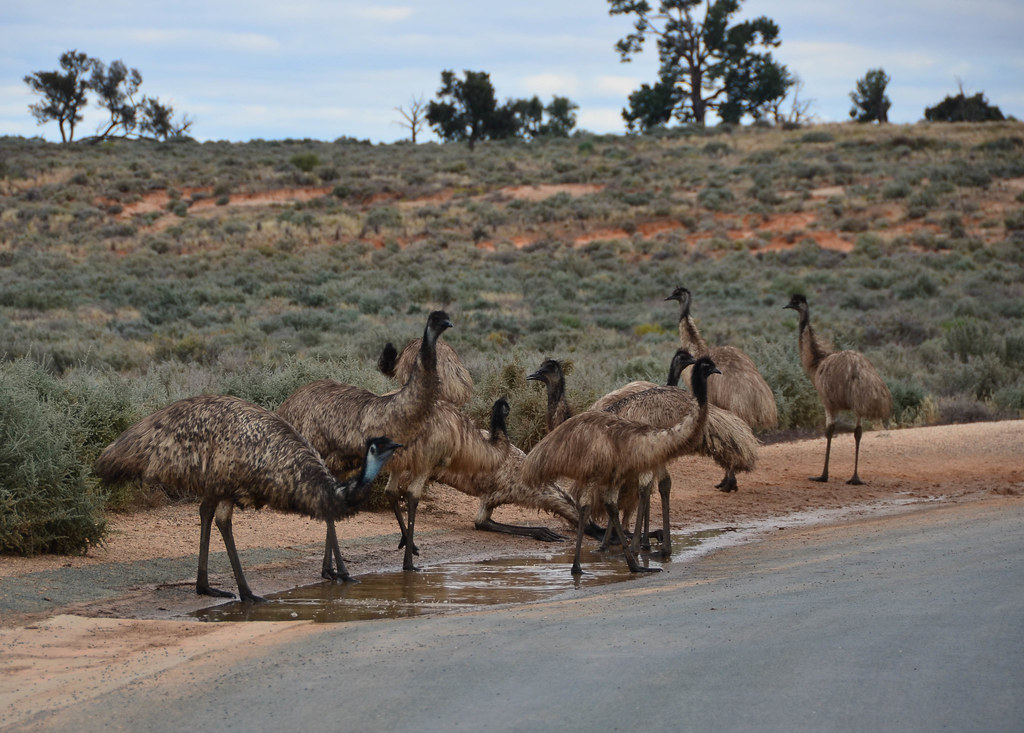
Emus by outtrimau5, on Flickr
By now it was time for another sunset. We headed out to Red Top boardwalks on the eastern shore of the lake and settled in with some drinks and some food. It was a little chilly but we had the place to ourselves.
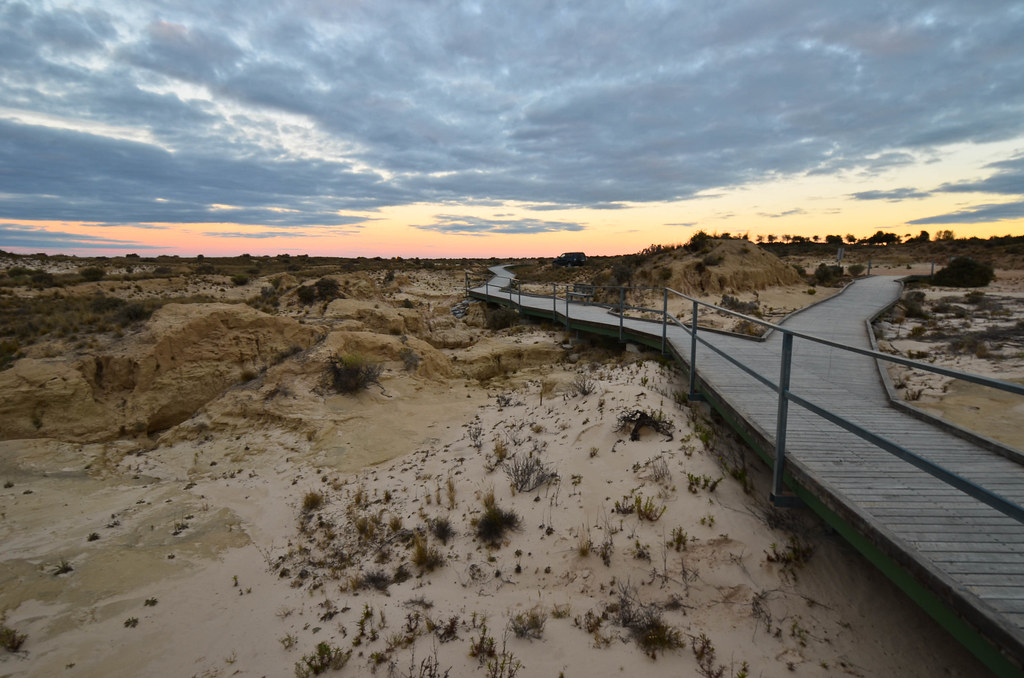
Lake Mungo, Red Top Lookout by outtrimau5, on Flickr
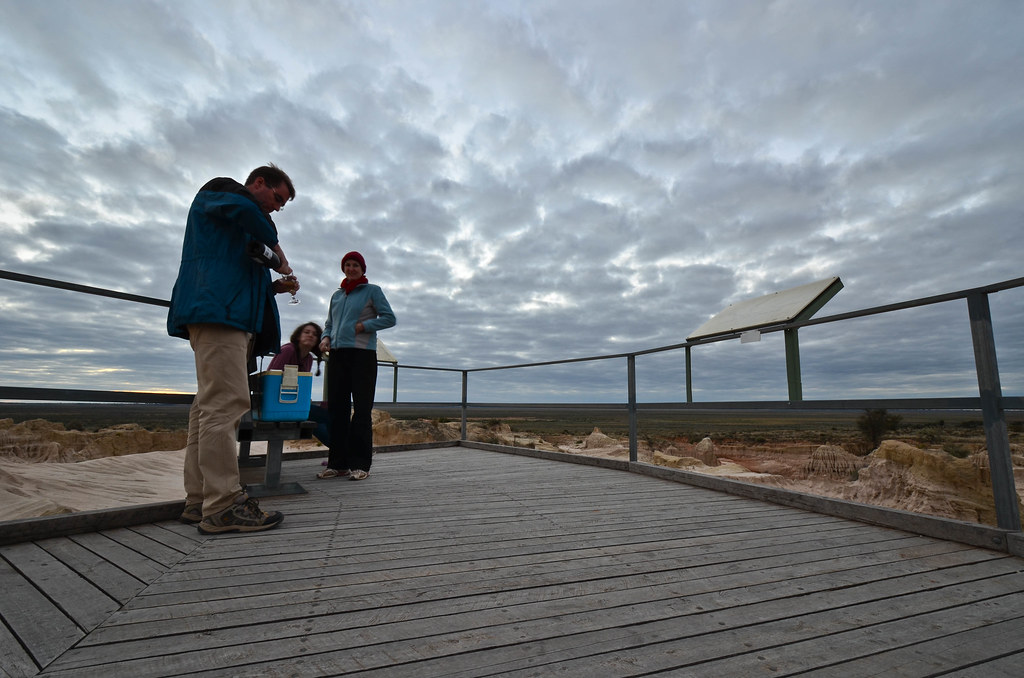
Lake Mungo, Red Top Lookout by outtrimau5, on Flickr
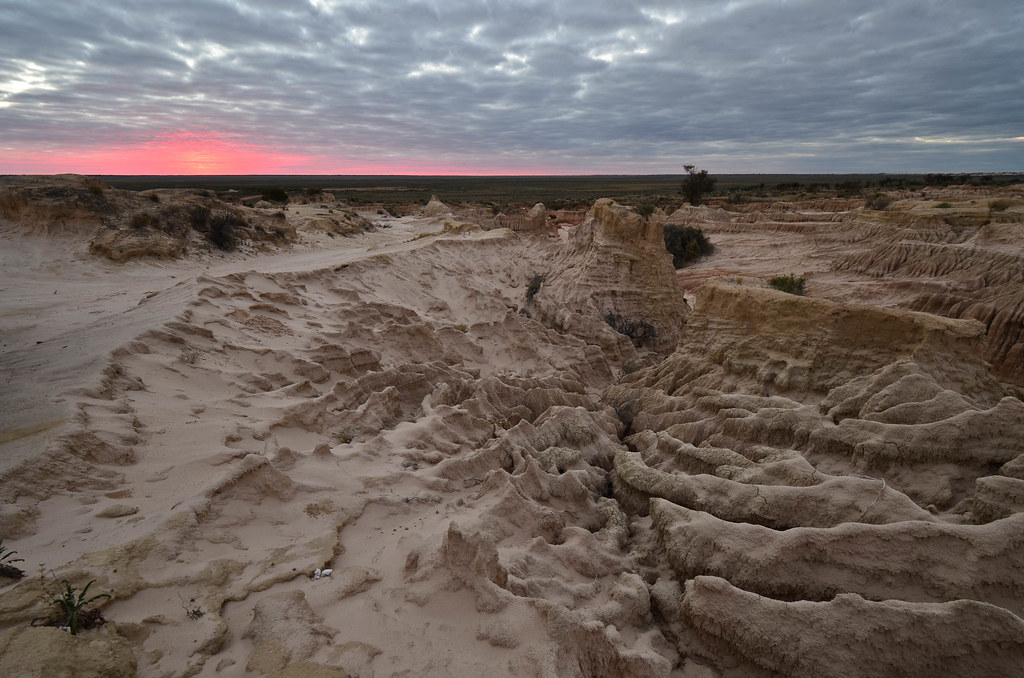
Lake Mungo, Red Top by outtrimau5, on Flickr
One more shot in the fading light before braving the 6 miles across the lake through the mad kangaroos.
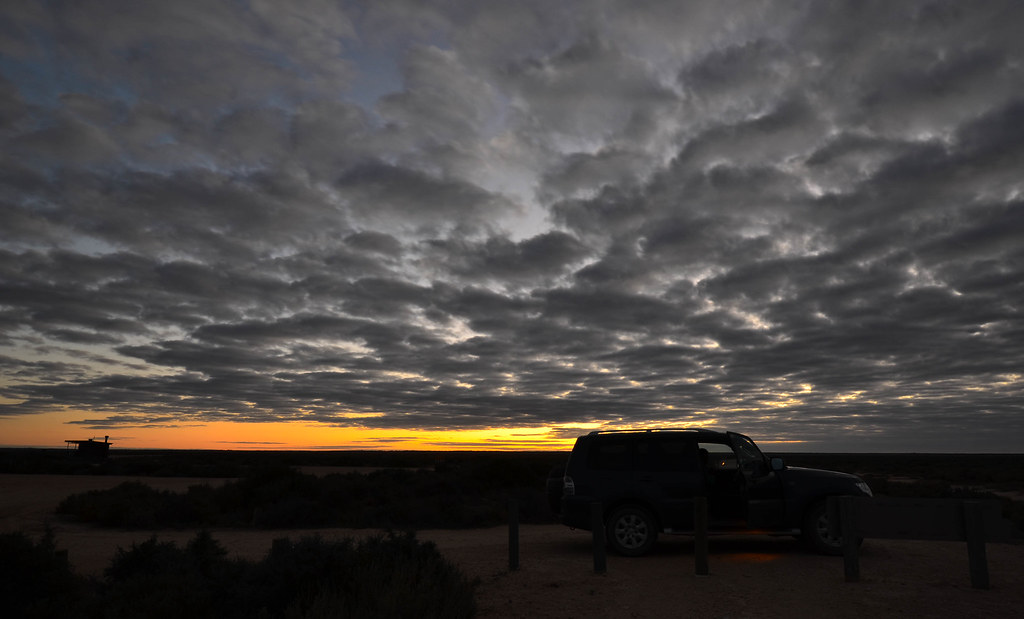
Lake Mungo Sunset by outtrimau5, on Flickr
The next morning we could see kangaroos bounding back and forth across the airstrip, it was only a 100 yards from our cabin. These would make landing interesting and even trickier than driving back after sunset in the dark.
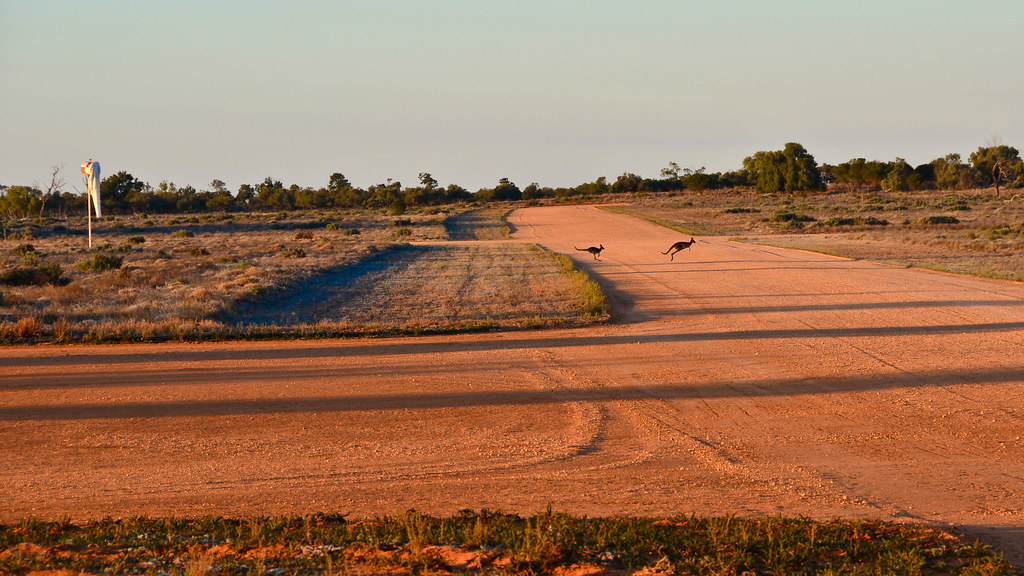
Mungo Lodge Airstrip by outtrimau5, on Flickr
That was our weekend done and all we had was a long drive home. We made it longer by meandering on some different back roads that see little traffic, or road maintenance, and in the first 150 miles we only passed one other car. After a ‘countery’ at the Jolly Jumbuck Bistro in Hay we set out across the Hay plains, flattest spot in the southern hemisphere. The roads are straight, the trees are few, and the horizon is a straight line. (Until you stitch a panorama together then you get some waves)

Hay Plains by outtrimau5, on Flickr

Hay Plains by outtrimau5, on Flickr
Featured image for home page:
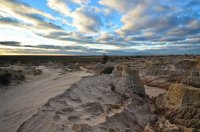
We had along our learner driver son and he wanted to clock up some log book hours on the long straight roads. Official lesson; learning to stay alert when there’s nothing going on. Just the odd semi coming the other way on a single lane of pavement where you learn to yield. Actual lesson; how to dodge sheep.

Learner Driver by outtrimau5, on Flickr
Balranald is the last town before Mungo, a small town on the highway between Sydney and Adelaide. It’s also the last chance for gas, from there it is 200 mile round trip mostly on rough dirt road. Travelling north of the small town of Balranald it is flat, scrub spotted plains with free range sheep, cattle and the odd windmill. Not much else.

Windmill by outtrimau5, on Flickr

Another windmill by outtrimau5, on Flickr
The last 70 miles to the park are teeth rattling dirt road. The Mungo Visitor Centre letterbox meant we were getting close.

Mungo National Park by outtrimau5, on Flickr
From the letterbox it was just ½ mile of pavement, the only pavement around, to the visitor centre. The visitor centre is often un-manned and features displays detailing the local archaeological and cultural history.
-Prehistoric giant wombats.
-Mungo Man. The remains of an ancient local man dated at 42,000 years old discovered on the shore of Lake Mungo.
-Mungo Lady. Cremated remains of a local lady also dating back 42,000 years and believed to be the oldest cremated human remains.
We paid the self service park fee and picked up a map. Being winter it was now getting late in the day and only an hour until sunset.

Lake Mungo, late afternooon. by outtrimau5, on Flickr

Kangaroos by outtrimau5, on Flickr

Mungo National Park by outtrimau5, on Flickr
The clouds had built up during the afternoon and blocked out the sun until only a couple of minutes before sunset. When the sun did break through there was a short but brilliant light display on the Walls of China and across the lakebed.

Mungo National Park by outtrimau5, on Flickr

Mungo National Park by outtrimau5, on Flickr

Mungo National Park by outtrimau5, on Flickr

Mungo National Park by outtrimau5, on Flickr
An evening meal at the Mungo Lodge (no roughing it for us) was followed by a seat at the fire place with other travelers, beer and too much red wine.
Next morning the galahs, including myself, were up early.

Mungo Lodge by outtrimau5, on Flickr
Near the visitor centre is a shearing shed constructed in 1869. It has stood up pretty well to the years and still smells of sheep.

Woolshed by outtrimau5, on Flickr
The road across the base of dry Lake Mungo is limetone base. Dusty, a little rough, but smooth enough and straight through prime kangaroo country. It is a fun drive after sunset

Lake Mungo by outtrimau5, on Flickr
Once we were across the lake we were off on the one way loop around the outback bush. The loop is 40 odd miles of more dirt road, two wheel ruts for much of the way hence the requirement for one way traffic. The countryside varies from open plains with belah trees, to reasonably thick mallee forest. Lots of wildlife; dozing kangaroos would poke their heads above the scrub to see who was going past, curious emus would poke on by to see what meals our passing had stirred up, galahs would continue making out in the trees regardless of who was watching.

Mungo Track Birdlife by outtrimau5, on Flickr

More Mungo Track Birdlife by outtrimau5, on Flickr

Mungo Track Wildlife by outtrimau5, on Flickr
Feral animals have taken their toll on the landscape stripping bare the vegetation and running the natives out of area. Rabbits are thick on the ground and seemingly beyond eradication. Feral goat herds still roam the bush but their numbers are reduced. A goat trap was constructed around this tank using the water to lure the goats where they would be contained and then trucked away ‘humanely’.

Feral Goat Trap by outtrimau5, on Flickr
Near Vigar Well, a near permanent water source, are some sand dunes. We didn’t have to walk far to leave the tourists behind and find virgin wind swept sand.

Dunes near Vigars Well by outtrimau5, on Flickr
The dunes border the lake at the northern end of the Walls of China.

Walls of China by outtrimau5, on Flickr
Although there were no people tracks there were many kangaroo, emu, rabbit and goat tracks criss-crossing the sand. Here’s some emu tracks with my size 12 Columbias along side.

Emu prints near Vigars Well by outtrimau5, on Flickr
Trying to be “arty”.

Dunes near Vigars Well by outtrimau5, on Flickr
Heading back towards the car my son decided he’d had enough and left me behind. He’s the little black streak on the far dune.

Sand Dunes by outtrimau5, on Flickr
Another windmill.

Zanci Tank, Lake Mungo by outtrimau5, on Flickr
More emus.

Emus by outtrimau5, on Flickr
The rabbit proof fence where it crosses Lake Mungo. One of many fences built in an attempt to keep the rabbits out in the early 1900’s.

Rabbit Proof Fence by outtrimau5, on Flickr
On the pavement outside the park visitor centre a few emus stopped by for a drink.

Emus by outtrimau5, on Flickr
By now it was time for another sunset. We headed out to Red Top boardwalks on the eastern shore of the lake and settled in with some drinks and some food. It was a little chilly but we had the place to ourselves.

Lake Mungo, Red Top Lookout by outtrimau5, on Flickr

Lake Mungo, Red Top Lookout by outtrimau5, on Flickr

Lake Mungo, Red Top by outtrimau5, on Flickr
One more shot in the fading light before braving the 6 miles across the lake through the mad kangaroos.

Lake Mungo Sunset by outtrimau5, on Flickr
The next morning we could see kangaroos bounding back and forth across the airstrip, it was only a 100 yards from our cabin. These would make landing interesting and even trickier than driving back after sunset in the dark.

Mungo Lodge Airstrip by outtrimau5, on Flickr
That was our weekend done and all we had was a long drive home. We made it longer by meandering on some different back roads that see little traffic, or road maintenance, and in the first 150 miles we only passed one other car. After a ‘countery’ at the Jolly Jumbuck Bistro in Hay we set out across the Hay plains, flattest spot in the southern hemisphere. The roads are straight, the trees are few, and the horizon is a straight line. (Until you stitch a panorama together then you get some waves)

Hay Plains by outtrimau5, on Flickr

Hay Plains by outtrimau5, on Flickr
Featured image for home page:

